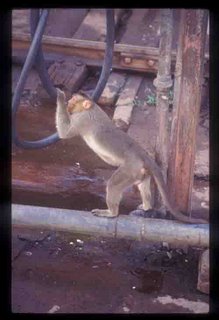
Published in The Hindu Sunday Magazine 2 Oct 2005
Which town, village and city in India does not have a monkey problem? The monkeys of Delhi are perhaps the most notorious Page 4 regulars when they are caught prowling through the chambers of Parliament, ripping up records and computers. They are not mere destroyers of crops and property; they transmit serious diseases to man– like TB and rabies. Although there are flashpoints of conflict all over the country there is no national policy on how to tackle them. Since all species of monkeys are protected by the Wildlife Protection Act the onus is on Ministry of Forests and Environment (MoEF) to do something about it.
Over the last six months, a draft action plan was circulated by the MoEF which advocates translocation of troops and sterilization of male monkeys. For years we were under the impression that wild animals will know how to take care of themselves when released in the wild. But we know differently now - studies carried out in recent years have highlighted a range of problems such translocated monkeys face. Young animals are taught which species of fruits and flowers to eat by their parents and other troop members much as a young leopard cub is taught to hunt by its mother. City born and bred simians are like fish out of water in the jungle. How do monkeys that are used to marriage halls and temples spontaneously know the varieties of edible forest fruits? How would monkeys used to dodging dogs and humans know about pythons and leopards? I wasn’t surprised when a monkey trapper employed by the Chennai Wildlife Warden’s office narrated an anecdote of monkeys who returned after traveling at least 14 km. They would rather risk coming back home to abuses and stone throwing than slowly starving to death in the forest.
Most translocated monkeys don't survive. Dr.Wolfgang Dittus, a primatologist of the Smithsonian Primate Biology Program, who has studied macaques for the last 30 years says bluntly, “Translocation of monkeys or any wildlife to a national park or wildlife refuge is a clear death sentence for the displaced – it is a political solution, not a biological one. It's a coward's way of killing the monkeys.” Despite researchers worldwide rejecting translocation as a method of solving animal conflict problems, translocation remains the main strategy underpinning the government’s action plan. If we were truly concerned about the safety and welfare of these urban monkeys, we would come up with realistic alternatives that aren’t so cruel.
The Ministry also proposes systematic sterilization of male monkeys. There are fewer males than females in a monkey troop and it might make superficial economic sense to target males. But as Dr. Dittus puts it, the catch is this: it takes just one single intact male that wanders close to a troop of fertile female macaques to impregnate every single one of them. Further, neutering male monkeys is not going to make them any less aggressive towards humans because they want food from us, not sexual favours. Dr. Dittus sums it up by saying that the only way we can control the monkey population explosion is by targeting the females of the troop for sterilization.
But who created the problem in the first place? We did, by willfully feeding free-ranging monkeys. When we feed monkeys we send the message that we are subordinate to them, says Dr. Dittus. So they begin to think that every human should feed them and ones that don’t have to shown their place. That’s when monkeys become aggressive and turn on people. There should be a ban on feeding of monkeys. Dr. Mewa Singh, a primatologist at the University of Mysore, further advocates the use of monkey-proof garbage bins so there is no other food available for wandering freeloaders. While citizens can help combat the problem this way, it is ultimately up to the authorities to come up with a realistic action plan that does not merely shunt the problem around and is humane to the animals.
There is a committed group of primatologists in this country whose expertise should be sought in drafting any action plan. A plan drawn up without their involvement will be scientifically unsound and in the long run it simply won’t work.
No comments:
Post a Comment